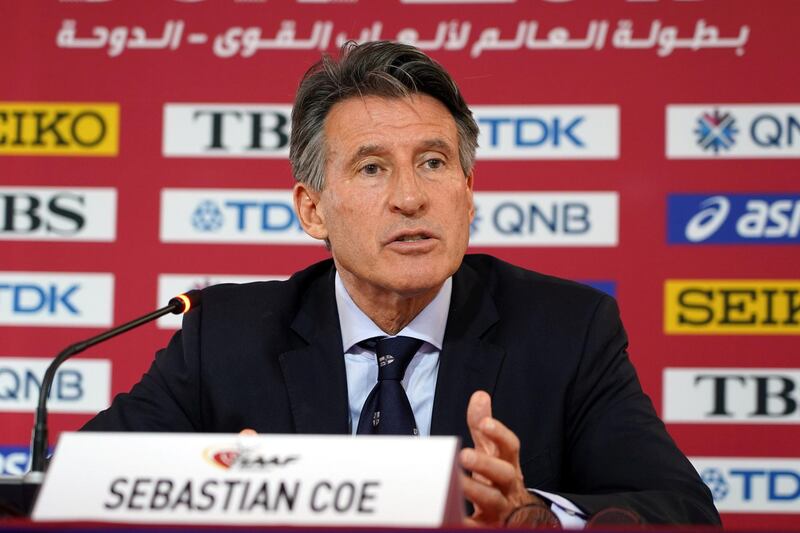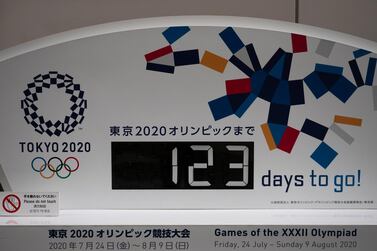World Athletics president Sebastian Coe has called for this summer’s Olympic Games in Tokyo to be postponed.
On Monday, the Briton became one of the most prominent voices supporting a suspension of the Games, drafting a letter to International Olympic Committee (IOC) president Thomas Bach in which he said the July event is “neither feasible or desirable” as countries around the world battle the coronavirus.
The IOC has insisted cancellation is "not on the agenda", but said on Sunday that postponing is a consideration, with a decision expected in four weeks. A "scaled-down" Games is also being discussed.
On Monday, Japan's Prime Minister Shinzo Abe conceded that a postponement would be unavoidable if a complete Games could not be held, while Canada and Australia became the first major countries to withdraw from both the upcoming Olympics and Paralympics.
The Canadian Olympic Committee (COC) and the country’s Paralympic Committee described the decision to pull out as “difficult” before “urgently” calling on the relevant bodies, including the World Health Organisation, to delay the Games for a year.
In his letter to Bach, Coe said: "No one wants to see the Olympic Games postponed, but as I have said publicly, we cannot hold the event at all costs, certainly not at the cost of athlete safety, and a decision on the Olympic Games must become very obvious very quickly.
"I believe that time has come and we owe it to our athletes to give them respite where we can."
Reasons for postponement
Coe, a double Olympic 1,500m champion, gave three main reasons for postponing the games: competition fairness, risk of injury and the emotional well-being of athletes.
On competition fairness, he said: "Every one of my area presidents believes that we can no longer expect a fair and level playing field in our sport given the number of athletes who are struggling to train in various countries due to measures put in place to reduce the spread of coronavirus."
Regarding risk of injury, he said: "If athletes are unable to train properly now we both know, as we have both been there, they will push themselves even harder closer to an Olympic Games, which will increase the propensity for injury."
On how the athletes were being mentally impacted by restrictions to training because of the virus, Coe added: "The uncertainty of the Olympic Games happening in July and the inherent desire and motivation to excel that resides in all our athletes is causing real anguish that we can, collectively, put a stop to."
In the past few days, a number of national Olympic governing bodies have urged the IOC to suspend the Games. The Olympics has never been postponed or cancelled during peacetime.
In a statement released on Monday, Canada's COC said: "While we recognise the inherent complexities around a postponement, nothing is more important than the health and safety of our athletes and the world community.
"This is not solely about athlete health - it is about public health. With Covid-19 and the associated risks, it is not safe for our athletes, and the health and safety of their families and the broader Canadian community, for athletes to continue training towards these Games."
The COC was soon joined by the Australian Olympic Committee (AOC), who announced it could no longer assemble a team for the July 24-August 9 event.
The Australian Team Chef de Mission for Tokyo, Ian Chesterman, said: "It's clear the Games can't be held in July.
"Our athletes have been magnificent in their positive attitude to training and preparing, but the stress and uncertainty has been extremely challenging for them.
"They have also shouldered the burden of concern for their peers around the world.
"While there will still be much to work out as a result of this change, the timing will allow athletes from around the world to properly prepare with the hope the coronavirus crisis will be under control."
The AOC chief executive, Matt Carroll, said he hoped the Games would go ahead in Tokyo, but not until the summer of 2021.
In response to the growing calls for a delay amid the pandemic, the IOC had said in their statement: “The IOC [executive board] emphasised that a cancellation of the Olympic Games Tokyo 2020 would not solve any of the problems or help anybody. Therefore, cancellation is not on the agenda.”







